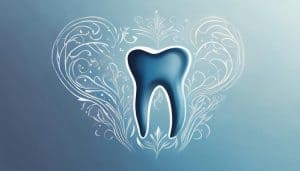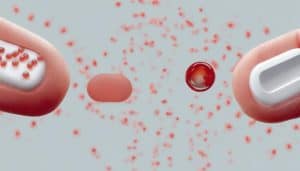To speed up your wisdom teeth recovery, focus on promoting blood clot formation by applying gentle pressure with gauze and reducing swelling with ice packs and elevation. Manage pain with medication and cold therapy, and prioritize rest and relaxation to aid in healing. Eat nutritious soft foods, stay hydrated, and attend follow-up appointments to guarantee proper recovery. By following these steps, you'll be well on your way to a smooth and speedy recovery. To further optimize your recovery and minimize potential complications, there's more to explore to get back to your normal self quickly and comfortably.
Key Takeaways
• Promote blood clot formation by covering the extraction site with gauze and applying gentle pressure to aid in tissue regeneration and reduce infection risk.
• Reduce swelling and inflammation by applying ice packs, elevating the head, and following anti-inflammatory medication instructions.
• Manage pain effectively by exploring pain relief medication, using cold therapy, and combining with rest and a soft food diet for recovery.
• Prioritize rest and relaxation by giving the body adequate rest, avoiding strenuous activities, and aiming for at least 7 hours of sleep per night.
• Follow a nutritious diet rich in protein, vitamin C, and essential nutrients, and stay hydrated by drinking 8-10 glasses of water daily.
Promote Blood Clot Formation
To facilitate a smooth and speedy recovery, you should prioritize promoting blood clot formation at the extraction site. This important step aids in tissue regeneration and reduces the risk of infection. By covering the extraction site with gauze and applying gentle pressure, you'll encourage blood clot formation, which is essential for preventing dry socket, a painful complication after wisdom teeth removal.
Following post-operative instructions, including gauze placement, helps guarantee the formation and stability of blood clots. This is essential, as blood clots protect the surgical site and accelerate the healing process. By maintaining blood clots post-surgery, you'll minimize complications during recovery and reduce the risk of infection.
Proper blood clot formation is key to a speedy recovery. It not only protects the surgical site but also promotes tissue regeneration, allowing your body to heal quickly and efficiently. By prioritizing blood clot formation, you'll be well on your way to a smooth and speedy recovery.
Reduce Swelling and Inflammation

After ensuring blood clot formation, your focus should shift to reducing swelling and inflammation, which can greatly impact your comfort and recovery pace. Swelling and inflammation can lead to discomfort, pain, and prolonged recovery time. Fortunately, there are several steps you can take to mitigate these issues.
| Technique | Description |
|---|---|
| Apply Ice Packs | Reduce swelling and inflammation by applying ice packs for 15-20 minutes every hour |
| Elevate Your Head | Decrease swelling in the surgical area by elevating your head while resting |
| Avoid Strenuous Activities | Refrain from activities that can increase swelling and prolong the recovery process |
In addition to these techniques, following your dentist's instructions for taking anti-inflammatory medication can also help manage swelling effectively. It's essential to stay hydrated by drinking plenty of water, as dehydration can worsen swelling and delay healing. Avoid consuming alcohol, as it can exacerbate dehydration and hinder the recovery process. By incorporating these methods into your recovery routine, you can reduce swelling and inflammation, promoting a smoother and faster recovery.
Manage Pain Effectively

As you navigate the recovery process, it's crucial to prioritize pain management to guarantee a smooth and comfortable experience.
You'll want to explore various strategies, including the use of pain relief medication, cold therapy benefits, and breathing exercises, to effectively minimize discomfort and promote healing.
Pain Relief Medication
You'll need to manage your pain effectively to guarantee a smooth recovery, and that starts with taking the right medication. To manage post-operative pain, your dentist may prescribe pain medication or recommend over-the-counter pain relief options like ibuprofen and acetaminophen.
It's crucial to take these medications as directed to guarantee effective pain relief without overdosing, which can hinder your recovery. Be sure to follow the recommended dosage and schedule to avoid adverse effects. If you experience severe pain that's not controlled by the prescribed medication, contact your dentist for guidance.
Combining pain medication with rest and a soft food diet can help speed up your wisdom teeth recovery process. By taking the right medication and following your dentist's instructions, you can minimize discomfort and promote a smooth recovery. Remember, effective pain management is key to getting back to your normal routine quickly.
Cold Therapy Benefits
Applying cold therapy, such as ice packs, within the first 36-48 hours post-surgery can greatly reduce pain and inflammation, setting you up for a smoother wisdom teeth recovery. This is because cold therapy helps manage pain effectively, reduces swelling around the surgical site, and promotes faster healing.
Here's how to maximize the benefits of cold therapy:
| Duration | Frequency | Benefits |
|---|---|---|
| 15-20 minutes | Every hour | Reduces pain and inflammation |
| 15-20 minutes | Every hour | Minimizes discomfort and bruising |
| 15-20 minutes | Every hour | Aids in swelling reduction |
| 15-20 minutes | Every hour | Enhances overall healing process |
Breathing Exercises Help
By integrating deep breathing exercises into your daily routine, you can effectively manage pain and promote relaxation during the wisdom teeth recovery process. This is essential, as pain management is vital to a smooth recovery.
Breathing exercises can help you relax, reducing stress and anxiety, which in turn supports faster healing. Proper breathing techniques can also increase oxygen flow to the surgical site, supporting your body's natural healing process.
Additionally, regular breathing exercises can improve your sleep quality, which is necessary for recovery after wisdom teeth removal. By incorporating breathing techniques into your daily routine, you can enhance your overall well-being and expedite the recovery process.
This simple yet effective technique can make a significant difference in your wisdom teeth recovery journey. By committing to regular breathing exercises, you'll be on your way to a faster, more comfortable recovery.
Prioritize Rest and Relaxation

After wisdom teeth removal, focus on giving your body the downtime it needs to heal, as this is essential for a speedy recovery. During this time, prioritize rest and relaxation to allow your body to recover from the surgery. Adequate rest helps reduce swelling, discomfort, and promotes healing of the surgical site. Aim to get at least 7 hours of sleep per night to aid in the recovery process.
Avoid strenuous activities that can exacerbate discomfort and swelling, and instead, take short walks for light movement to aid in circulation and overall well-being. By doing so, you'll be contributing to a smoother and quicker healing process post-surgery.
Eat Nutritious Soft Foods

To support your body's healing process, focus on consuming nutrient-dense soft foods that provide essential vitamins, minerals, and energy. As you recover from wisdom teeth removal, it's vital to fuel your body with the right foods to aid in healing. Opt for soft foods like yogurt, mashed sweet potatoes, and scrambled eggs, which are rich in nutrients and easy to digest.
Incorporate protein-rich foods into your diet, such as smoothies with protein powder, cottage cheese, and pureed beans, to provide energy and support your body's repair process. Vitamin C sources like blended fruits, soups with vegetables, and applesauce are also essential for immune support and healing.
Additionally, high-fiber options like oatmeal, cooked vegetables, and lentil soup can help maintain digestive health. Remember to avoid hard or crunchy foods that can irritate the surgical site, sticking to a soft diet for faster recovery.
Maintain Oral Hygiene

Now that you've got a handle on your diet, it's time to focus on maintaining good oral hygiene to speed up your wisdom teeth recovery.
You'll want to brush gently around the extraction sites to prevent infection and rinse your mouth with salt water multiple times a day to aid in healing.
Gentle Brushing Techniques
You'll need to adopt gentle brushing techniques to maintain oral hygiene during the recovery period, focusing on soft-bristled toothbrushes and circular motions to clean your teeth and gums without disrupting the surgical sites. This is essential for promoting faster healing and ideal recovery.
When brushing, use a soft-bristled toothbrush to gently clean your teeth and gums, avoiding vigorous movements that can irritate the surgical areas. Instead, use gentle circular motions to remove any debris or bacteria, taking care not to dislodge the blood clot or disturb the extraction sites.
By adopting these gentle brushing techniques, you'll be able to maintain good oral hygiene without compromising your recovery. Remember to follow your dentist's instructions on when and how to resume regular brushing, and avoid using harsh mouthwashes or abrasive toothpaste that can hinder the healing process.
Rinse With Salt Water
After wisdom teeth removal, rinsing with salt water becomes an important part of your oral hygiene routine to reduce bacteria, prevent infection, and promote healing.
To create a salt water rinse, mix warm water with salt to create a gentle solution for oral hygiene. This practice is recommended as part of your post-operative care to promote healing and reduce discomfort.
You should rinse your mouth multiple times a day, following your dentist's specific instructions. By maintaining good oral hygiene with salt water rinses, you can aid in faster recovery and minimize the risk of complications.
This simple yet effective practice helps keep the surgical site clean, reducing bacteria and promoting a smooth recovery. Remember, a salt water rinse is a vital step in your oral hygiene routine, and it's important to adhere to your dentist's guidelines to ensure a speedy recovery.
Follow Post-Surgery Instructions

By carefully following your dentist's post-surgery instructions, you can greatly reduce the risk of complications and promote a smooth, speedy recovery. Your dentist has tailored these instructions to guarantee your specific needs are met, so it's important to follow them closely.
To guarantee a successful recovery after wisdom tooth extraction, remember:
- Avoid straws: Sipping through a straw can dislodge the blood clot, leading to dry socket and prolonging your recovery.
- Comply with prescribed medications: Take your medications as directed to minimize discomfort and prevent infection.
- Rinse with warm salt water: Gently rinse your mouth with warm salt water to keep the surgical site clean and promote healing.
- Rest and avoid strenuous activities: Give your body time to heal by getting plenty of rest and avoiding activities that can dislodge the blood clot.
Attend Follow-Up Appointments

Following your dentist's post-surgery instructions is just the first step towards a smooth recovery; attending follow-up appointments is equally important to make certain you're healing properly. These appointments are essential for monitoring your healing progress after wisdom teeth removal. Your oral surgeon or dentist will assess your recovery, address any concerns you may have, and provide additional care if needed.
By attending these appointments, you'll guarantee proper healing, reduce the risk of complications, and promote a faster recovery.
During these appointments, your dentist may remove stitches, check for signs of infection, and provide guidance on returning to normal activities. They'll also be able to identify any potential issues early on and take corrective action.
Missing these appointments can have the opposite effect, delaying healing, increasing the risk of complications, and hindering the overall recovery process. By prioritizing your follow-up appointments, you'll receive the best possible dental care and minimize the risk of setbacks.
Seek Prompt Professional Help

As you navigate the recovery process, it's important that you're proactive in seeking help when needed.
You should be able to recognize early warning signs of complications, identify potential post-op issues, and manage pain effectively to guarantee a smooth recovery.
Recognize Early Warning Signs
Recognizing the early warning signs of complications after wisdom teeth extraction is crucial, and it's important that you're vigilant about monitoring your recovery. This will enable you to identify potential issues early on and seek prompt professional help if needed.
Watch out for these warning signs:
- Severe pain that doesn't subside with medication
- Excessive bleeding that doesn't stop after applying gentle pressure
- Signs of infection, such as pus, fever, or swelling that worsens over time
- Unusual symptoms like persistent numbness, difficulty swallowing, or a persistent bad taste
If you experience any of these warning signs, don't hesitate to contact your dentist. Early intervention can prevent further complications and speed up your recovery.
Identify Post-Op Complications
Identifying post-operative complications promptly is essential, as delays in seeking professional help can lead to further complications and prolong your recovery. You must recognize signs of post-operative complications, such as excessive bleeding, severe pain, or signs of infection.
If you experience persistent swelling, fever, or difficulty swallowing, promptly contact your oral surgeon. Immediate professional help is vital if you notice pus discharge, foul odor, or prolonged numbness in the surgical area.
Don't ignore unusual symptoms like persistent bad taste in the mouth or difficulty opening your mouth – address them promptly. Identifying and addressing post-operative complications early can prevent delays in the healing process and ensure excellent recovery.
Manage Pain Effectively
To minimize discomfort and promote a smoother recovery, it's vital that you take control of your pain management by following your dentist's recommended regimen and seeking prompt professional help if needed. This will enable you to manage pain effectively, which is essential for a faster and more comfortable recovery.
Here's what you need to do:
- Take your prescribed pain medication promptly to manage discomfort and promote healing.
- Addressing pain effectively can improve your overall comfort and well-being during the recovery period.
- Following the recommended pain relief regimen can help speed up wisdom teeth recovery by reducing discomfort and promoting proper healing.
- Contact your dentist if pain persists or worsens for prompt professional assistance, as proper pain management is key to a smoother and faster recovery process.
Use Cold Compresses Wisely

You can accelerate your recovery by applying cold compresses to the cheeks near the extraction site, a technique that's most effective during the first 24-48 hours after wisdom teeth removal surgery. This simple yet powerful method can greatly reduce swelling, alleviate pain, and speed up your recovery process.
To get the most out of cold compresses, apply them for 15-20 minutes every hour. This will constrict blood vessels, decrease blood flow, and numb the area, making you feel more comfortable.
Remember to place a cloth or towel between the cold compress and your skin to avoid ice burns. Consistency is key, so try to maintain a regular schedule of applying cold compresses throughout the day. By doing so, you'll reduce inflammation and promote a smoother recovery.
Don't underestimate the power of cold compresses – they can make a substantial difference in your recovery process. By incorporating this technique into your post-surgery routine, you'll be back to your normal self in no time.
Stay Hydrated and Energized

Water becomes your best friend immediately after wisdom teeth removal, as staying hydrated is essential for a speedy recovery. Proper hydration can help reduce swelling, promote healing, and prevent complications post-surgery.
To aid in the healing process, drink plenty of water to stay hydrated. Opt for hydrating fluids like coconut water or electrolyte drinks to replenish lost fluids. These fluids will help you stay energized and focused throughout your recovery.
Here are some tips to help you stay hydrated and energized:
- Drink at least 8-10 glasses of water per day to stay hydrated and aid in the healing process
- Opt for hydrating fluids like coconut water or electrolyte drinks to replenish lost fluids
- Consume nutrient-rich foods like smoothies and soups to provide energy during recovery
- Avoid sugary or caffeinated drinks that can hinder hydration and slow down recovery
Can the Recovery Methods for Wisdom Teeth be Applied to Recover from Radiation After a CT Scan?
Recovering from a CT scan involves letting the body naturally eliminate radiation. Similarly, recovery methods for wisdom teeth, such as rest, pain management, and following post-care instructions, can aid in getting rid of radiation after a CT scan. It’s important to stay hydrated and follow medical advice for a smooth recovery.
Can Home Treatments for Green Nails Affect Wisdom Teeth Recovery?
Home treatments to treat green nails at home, such as using tea tree oil or soaking in apple cider vinegar, should not affect wisdom teeth recovery. However, it’s always best to consult with a healthcare professional before trying any home remedies, especially if you are recovering from a dental procedure.
Frequently Asked Questions
How to Speed up Recovery From Wisdom Teeth Removal?
You're wondering how to speed up recovery from wisdom teeth removal. To accelerate the process, prioritize self-care. Apply ice packs to reduce swelling and take prescribed pain meds as directed.
Stick to soft foods, maintain good oral hygiene, and get plenty of rest. Avoid strenuous activities and attend follow-up appointments.
What Is the Hardest Day After Wisdom Teeth Removal?
You're traversing a stormy recovery road, and the hardest day after wisdom teeth removal is like hitting a turbulent storm surge – it's usually the second or third day, when pain and swelling peak.
You'll need to batten down the hatches with diligent pain management and swelling reduction techniques. Stay on top of your post-op care, rest, hydration, and meds, and you'll ride out this stormy day.
Do Top or Bottom Wisdom Teeth Heal Faster?
You'll be pleased to know that top wisdom teeth tend to heal faster than bottom wisdom teeth. This is because top teeth are generally easier to access and clean, leading to a smoother extraction process.
On the other hand, bottom wisdom teeth are more deeply rooted and may cause more discomfort, resulting in a longer recovery period.
How Long Does It Take for Wisdom Teeth Holes to Heal?
Your wisdom teeth holes are like a puzzle, slowly coming together piece by piece. Now, you're wondering how long it takes for them to heal.
Typically, the initial healing phase lasts around 1-2 days, but complete closure can take up to 6 weeks. Factors like your individual healing ability and any complications can impact the timeline.
Conclusion
You've made it through the wisdom teeth removal process! Now, focus on a speedy recovery.
Did you know that 5 million people in the US have their wisdom teeth removed each year?
By following these tips, you'll be back to normal in no time. Remember, a smooth recovery is just as important as the surgery itself.
Stay on track, and you'll be flashing your healthy, wisdom-free smile in no time.



